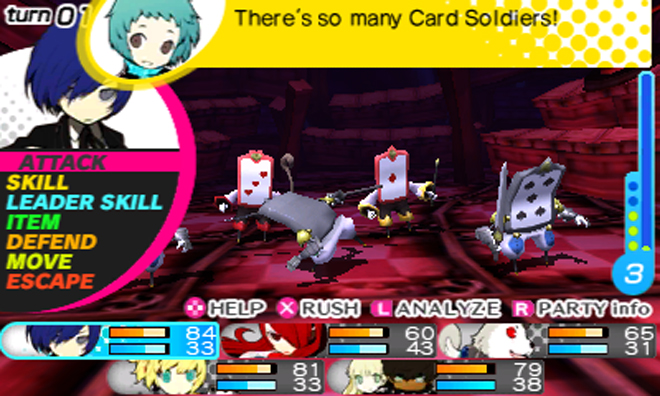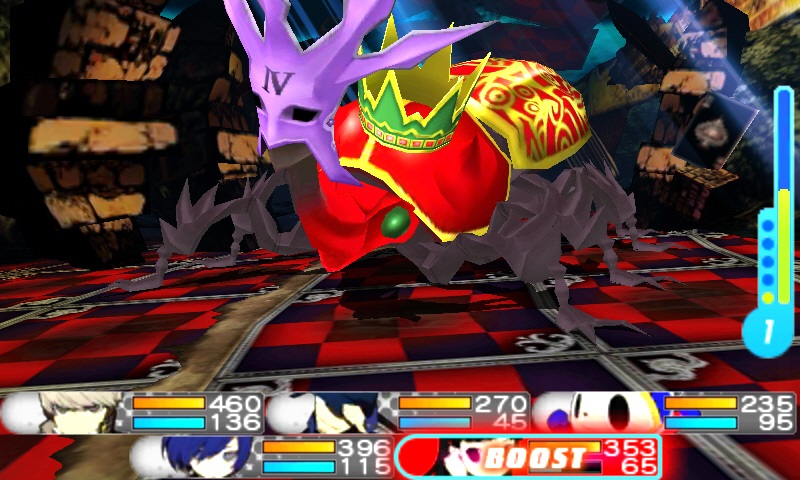Search
[{{{type}}}] {{{reason}}}
{{/data.error.root_cause}}{{{_source.title}}} {{#_source.showPrice}} {{{_source.displayPrice}}} {{/_source.showPrice}}
{{#_source.showLink}} {{/_source.showLink}} {{#_source.showDate}}{{{_source.displayDate}}}
{{/_source.showDate}}{{{_source.description}}}
{{#_source.additionalInfo}}{{#_source.additionalFields}} {{#title}} {{{label}}}: {{{title}}} {{/title}} {{/_source.additionalFields}}
{{/_source.additionalInfo}}- Details
- Category: 3DS
- By Jason Gress
- Hits: 9211
Persona Q: Shadow of the Labyrinth (3DS)

Persona Q: Shadow of the Labyrinth
Developed By: Atlus
Published By: Atlus
Release Date: November 25, 2014
Available On: Nintendo 3DS
Genre: Role-Playing Game
Number of Players: 1
ESRB Rating: M for Blood, Language, Partial Nudity, Sexual Themes, Violence
Price: $45 on Leaptrade
Thank you Atlus for sending us this game to review!
NOTE: The reviewer's 3DS broke about three quarters into the game, after over fifty-seven hours of playing, during the fourth dungeon. Given the near release of the New 3DS XL, it seemed best to publish this as is, and wait on replacing the 3DS. If anything else is discovered that warrants an update to this review, we will do so.
Persona Q: Shadow of the Labyrinth is the first of it's kind - a marriage of the excellent but niche Etrian Odyssey franchise with the more mainstream (but still niche) Persona series to create a very well done hybrid. It has both the cast from Persona 3, and those from Persona 4, together for a unique story, with gameplay that greatly resembles Etrian Odyssey. The basics of dungeon crawling are clearly an evolution of the systems set in Etrian Odyssey Untold: The Millenium Girl, and if you are not familiar with the series, I recommend you read our review.
To recap, the dungeon crawling aspect is based on classic experiences like Wizardry, with first person exploration, challenging battles, and character customization. Creating a map on the bottom screen is an integral part of the experience, and if this is skipped, the player will definitely pay the price. While there is a basic auto map feature that you can enable, it fills in nowhere near the detail that you need for a successful dungeon romp. The more details you take note of, the more prepared you are for various requests and solving puzzles.
Instead of creating your own characters with distinct classes, or having a preset party that you can't change, you instead start with a rather large roster consisting of the entire Persona 3 or 4 cast (you choose), and eventually grows to be even larger as the other cast joins your ranks. Each character has their own persona, which has unique stats, immunities, and weaknesses, as well as skills learned as they grow in level. Party composition becomes a very important part of the strategy.

Strong Points: Very long and deep adventure, with tons of replay value; Very challenging (if you choose the proper difficulty level); Fun and lovable characters, along with excellent voice acting; some laugh out loud humor; enjoyable soundtrack
Weak Points: Some of the characters are not well developed if you haven't played other Persona games
Moral Warnings: Foul language like 'd*mn', 'h*ll', 'sh*t', 'bullsh*t' used throughout, with some instances of d*ck used; some enemies and personas wear little or no clothing; tarot cards play an important part in the game and story; some very dark and spooky environments, including pools of blood; one character is sexually confused (wishes she was a boy); crossdressing competition; game asks if sex of your 'match' matters; male characters scheme to get a peek up a girl's skirt; an enemy boss is a 'Strange Merciful Clergyman', who parodies a priest
Another big component of customizing your party are secondary personas and persona fusion. Personas are a latent part of a person's personality, that is brought out while fighting the enemies, which are called shadows in this series. Sometimes, after defeating them, you are given a persona in addition to normal loot upon victory. Once unlocked, you can fuse together multiple personas to make new and potentially more powerful ones, with skills combined from the source personas. There are interesting and complex rules on what kinds of combinations can be made, including double vs. triple fusions, as well as what kind and how many skills can be brought forward. Combine this with skill cards, which can be found in game or extracted from personas, and the character customization can be almost endless. It's a very deep system that can be really fun to figure out and explore.
Like Etrian Odyssey, often, instead of an enemy dropping a weapon (how many mice carry longswords anyway?), they drop materials, which Theo can often craft into new and more powerful weapons, armor, accessories or items. Accessories can do lots of different and useful things, including the rather unique stat swap items. For example, characters who have a powerful magic stat, can have their magic and strength stats swapped, if you wish to make that person a powerful warrior instead. There are many other unique accessories, that do everything from increase stats to change elemental resistances. These, along with the things mentioned above, bring yet another layer of character customization to the table.
The game is fairly challenging, but not nearly to the level of Etrian Odyssey, at least for me. While there are some difficult battles, it never felt nearly hopeless, or hanging on by a thread and prayer, like Etrian regularly delivers. There are also some nice quality of life improvements that make it a little bit easier to deal with. One huge example is multiple save slots. You can actually save three slots to the cartridge, plus many more to the SD card. I haven't seen too many games take advantage of the SD card in that way; it's welcome here. Etrian games, sadly, usually come with only one save slot. Despite this, there is no reason to have two separate saves, one with each party, as there is a new game plus mode, which you can play as the other party if you choose.
With the large, tight knit cast of characters, one thing really comes out that many miss, and that is humor. From silly teenage squabbles (though I suppose that could account for most of them) to ridiculous quests, there are many laugh out loud moments in Persona Q. I found myself chuckling at Rei's silly food misunderstandings, and laughing at Akihiko's protein pontifications, and enjoying the very well written back and forth throughout. The writing has to be one of the best parts of this game. I really enjoyed seeing each character grow, and laughing along with them. And the voice acting is top notch. As is the music – some of those songs are really catchy. Graphically, I was satisfied, even if it's not the best I have seen on the 3DS.

Higher is better
(10/10 is perfect)
Game Score - 92%
Gameplay - 18/20
Graphics - 8/10
Sound - 10/10
Stability - 5/5
Controls - 5/5
Morality Score - 51%
Violence - 4/10
Language - 4/10
Sexual Content - 5/10
Occult/Supernatural - 4/10
Cultural/Moral/Ethical - 8.5/10
With that said, despite the fun, the game does include some inappropriate content. Certain curse words, like d*mn, bullsh*t, damm*t, and h*ll are used throughout and often, and are also voice acted. There are tarot cards used as plot devices. Some of the male characters are, well, opportunists when it comes to the ladies, and try to make moves on the girls (and fail). This includes a failed attempt to look up a girl's skirt. There is a rather strange term called 'poinking' in the text, that is a hard to translate triple entendre, that clearly is at least partly sexual in nature. Several of the personas and enemies are wearing very little clothing; in at least one case, a statue-like enemy appears naked, but their features are smoothed out; it's possible there are bikini-like clothes on, but it's hard to tell. One persona wears bondage-like clothing, and others are in somewhat suggestive poses, or are human animal hybrids with female features.
One of the female characters seems to regret that she is a girl, and would prefer to be a boy. A quest has a male character drinking a love potion, and the first person he sees is… another guy. There is a 'pick up girls' quest, as well. I also noted a certain 'fan fiction' mentioned that deals with a man and woman separated at birth, who meet later, with only months to live, who start dating. There is also a cross dressing contest at a culture festival.
One of the bosses of a labyrinth is called a 'Strange Merciful Clergyman', who is a rather odd parody of a priest. You are put into a demented marriage-like ceremony, and while fighting with this 'priest', he says things like 'You do not believe in the word of God? That is a SIN!' There is also a room called 'Sweets H*ll' in the game. There is also a dungeon which is quite spooky, with pools of blood in abundance.
Persona Q: Shadow of the Labyrinth is a very well done collaboration between the underrated Etrian Odyssey series, and the popular Persona series. The game itself is very enjoyable – fusing great writing with top notch dungeon crawling. I will say that if you have not played a Persona game before, as I had not, some of the characters are not explained or introduced well, as it's assumed you already know them. This can occasionally lead to confusion. Despite all of this, if you have already enjoyed Persona games, and are comfortable with their content, then this game would have a high recommendation. I do not believe this should be played by younger players, or those who don't want to hear occasional profanity or the other things mentioned above. Outside of that, this is possibly one of my favorite dungeon crawlers yet.




